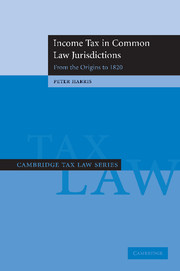Book contents
- Frontmatter
- Contents
- List of tables
- List of maps
- List of statutes
- Preface
- Introduction
- 1 To 1641: Searching for seeds in feudal England
- 2 1642 to 1688: Religion, revolt and restoration
- 3 1688 to 1763: Regional relations, colonial competition and impending independence
- 4 1763 to 1792: Empire divided
- 5 1793 to 1820: the Napoleonic battle, the mighty engine and the immediate aftermath
- Conclusion
- Appendix
- References
- Index
4 - 1763 to 1792: Empire divided
Published online by Cambridge University Press: 10 December 2009
- Frontmatter
- Contents
- List of tables
- List of maps
- List of statutes
- Preface
- Introduction
- 1 To 1641: Searching for seeds in feudal England
- 2 1642 to 1688: Religion, revolt and restoration
- 3 1688 to 1763: Regional relations, colonial competition and impending independence
- 4 1763 to 1792: Empire divided
- 5 1793 to 1820: the Napoleonic battle, the mighty engine and the immediate aftermath
- Conclusion
- Appendix
- References
- Index
Summary
By comparison to the previous chapters, this chapter and the next each cover the relatively short periods of twenty-nine and twenty-eight years, respectively. Each chapter is centred on a major war. This chapter is centred on the American War of Independence (1775–83, alternatively known as the American Revolutionary War) and is structured under three headings. The first heading considers developments in direct taxation during the disquiet and pivotal events leading to the war. The Seven Years War had been the most expensive ever for Britain and had resulted in the greatest increase in the national debt. There was a perception that the American colonies had benefited disproportionately from this war at the expense of the British national debt. This was particularly so considering the substantial compensation paid by Britain to the colonies for war expenditure, which enabled many of them to discharge large portions, if not the entire amount, of their own debts.
Under the burden of this debt Grenville, the Chancellor of the Exchequer, perceiving the prosperity of the colonies, proposed to levy a light tax to assist in easing the burden in Britain. But for the Americans, taxation by the British Parliament raised fundamental constitutional issues. They had no representation in the British Parliament and, therefore, maintained that to seek to tax them was unconstitutional; no taxation without representation. It will be recalled that direct taxation in both Wales and Scotland followed the granting of representation in the English Parliament (see pp. 51 and 195, respectively).
- Type
- Chapter
- Information
- Income Tax in Common Law Jurisdictions , pp. 294 - 364Publisher: Cambridge University PressPrint publication year: 2006

